6. Latin America and the Caribbean
Latin America and the Caribbean region is an enormous market, having a population of 600 million and a regional GDP of approximately $5.6 trillion as of 2015, which makes it an important region in terms of international trade strategy. The region has steadily enhanced its presence in the international community through the consolidation of democracy, and also as a supplier of iron ore, copper, silver, rare metals (minor metals), crude oil, natural gas, biofuels, and other minerals and energy resources, as well as food resources. Although the average income level in the region is relatively high among ODA recipient countries, the region is characterized by significant income disparities between the rich and the poor and a large number of people suffer from poverty. In addition, while it is a region rich in natural environment such as the Amazon Rainforest, it is also vulnerable to natural disasters such as earthquake and hurricane. Therefore, it is also important to make efforts to address environmental issues, climate change and disaster risk reduction.
<Japan’s Efforts>
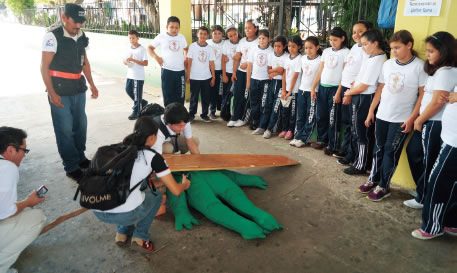
A Japan Overseas Cooperation Volunteer, Ms. Madoka Yamaguchi (Disaster Response Policy) teaches methods to rescue disaster victims pinned under collapsed buildings at a school in San Vicente Municipality, El Salvador. San Vicente suffered a massive earthquake in 2001. (Photo: Ernesto Manzano / JICA)
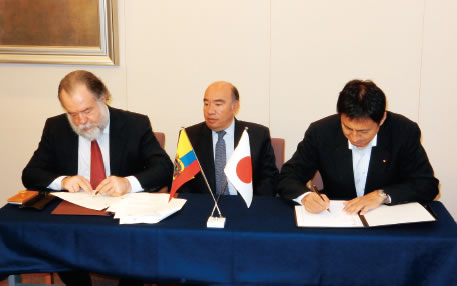
In September 2016, Parliamentary Vice-Minister for Foreign Affairs Shunsuke Takei and Mr. Leonardo Carrión Equiguren, then Ambassador of Ecuador to Japan, signed and exchanged notes regarding a total of ¥200 million in grant aid to Ecuador (Economic and Social Development Programme) in the presence of Mr. Fernando Yepez Lasso, then Vice Minister of Foreign Affairs and Human Mobility.
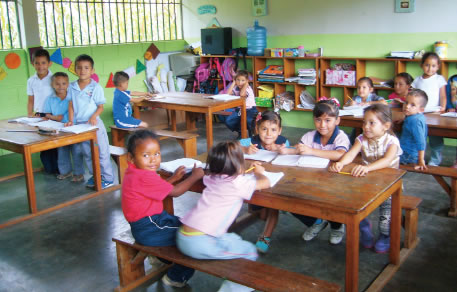
Children study at the Los Bancos school in Apure near the border with Columbia, in the western region of Venezuela. School buildings, water supply facility and toilets were constructed through support from Japan. (Photo: Kyoko Katoh / Embassy of Japan in Venezuela)
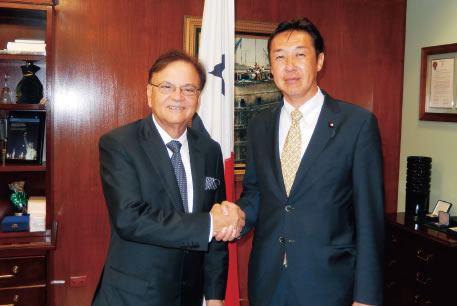
Then Parliamentary Vice-Minister for Foreign Affairs Hitoshi Kikawada talks with Mr. Roy, Minister of Canal Affairs of Panama and CEO of El Metro de Panamá during his visit to Panama in July 2016.
The Latin American and Caribbean region is prone to natural disasters such as earthquakes, tsunamis, hurricanes, and volcanic eruptions. Therefore, Japan’s assistance for this region, utilizing Japan’s knowledge and experience in the field of disaster risk reduction, is highly appreciated. Japan has provided assistance in anti-earthquake and anti-tsunami measures utilizing Japan’s expertise in the disaster risk reduction field to the countries located in the Caribbean Sea, including reconstruction and development support that Japan provided to Haiti, which suffered catastrophic damage from the huge earthquake with a magnitude of 7.0 that occurred in January 2010, and the countries next to the Pacific Ocean, such as Ecuador where a major earthquake struck in April 2016. Japan has implemented reconstruction support for Haiti, totaling more than $250 million to date, and continues support from a medium- to long-term perspective by carrying out reconstruction support centered in the field of basic social services such as health and hygiene, and education. Furthermore, the Project on Capacity Development for Disaster Risk Management in Central America named “BOSAI”, which aims to share expertise of disaster risk reduction and reduce disaster risks at the local community level, has achieved significant results in the region.
In recent years, Latin America and the Caribbean region have been drawing attention as a manufacturing base and a market, which has led many Japanese companies to expand their businesses to this region. After holding a training session on cardiac catheterization techniques* for physicians in Mexico in 2011, Japan has held the same training also in Argentina, Colombia, and Brazil from 2014 to 2016. Through this training, further dissemination of Japanese companies’ techniques across the Latin American and Caribbean region is expected. In addition, from the perspective of laying the foundation for the economic development of Latin American and Caribbean countries, Japan has been actively implementing infrastructure development in the metropolitan and regional areas.
Japan has been providing cooperation on a wide range of environmental issues in the region, including assistance to scientific and technological research on climatic phenomena, conservation of biodiversity, broad-range evaluation of carbon dynamics (Note 10) of Amazonian forests, and construction of waste disposal facilities. In the area of renewable energy, which has been receiving wider attention in recent years, Japan has provided support for introducing solar power generation in many countries, as well as for constructing geothermal power plants in Costa Rica, and elsewhere.
Japan also provides various kinds of cooperation for Latin American and Caribbean countries in the medical and healthcare area. In the Central American region, Japan has provided technical assistance to eradicate Chagas disease, a parasitic disease specific to the region, and has been contributing to the reduction of infection risk. In Honduras in October 2016 an Exchange of Notes for the construction of facilities and provision of testing equipment, etc. to carry out testing and surveillance was signed as support for measures to combat infectious diseases, etc. In the area of sanitation, Japan has also conducted numerous projects to assist in the construction and improvement of water and sewer systems in order to ensure the supply of safe drinking water and to promote the recycling of domestic water. In September 2016, Prime Minister Abe visited Cuba and as an outcome of the Japan-Cuba Summit Meeting, an Exchange of Notes concerning the provision of medical equipment with an aim of strengthening Cuba’s cancer diagnosis capacity and minimally-invasive medical treatments, as the first full-fledged grant aid, was signed. Along with this, Japan announced the implementation of new technical cooperation in order to strengthen and improve medical structures for diagnosing cancer and other diseases.
Assistance in the field of education is extremely important for Latin American and Caribbean countries, because of the poverty and the insufficient educational budget. Japan has provided support for building educational facilities such as primary schools, as well as dispatching volunteers to improve the capacity of teachers. Such efforts are highly appreciated.
For Caribbean countries, Japan has made many efforts to address their vulnerabilities particular to Small Island Developing States (SIDS), in the fields of climate change and natural disasters, taking into account various needs which cannot be measured only by per capita income. In the field of the environment and disaster risk reduction, Japan has been implementing projects such as a regionwide grant aid on climate change in the eight Caribbean countries and technical cooperation on disaster risk reduction. In the fisheries field, Japan has been contributing to promoting the sustainable use of limited living marine resources by improving facilities or dispatching experts.
The examples of achievements among development cooperation lasting many years are the joint cooperation with Brazil, Mexico, Chile and Argentina. These four countries have come to obtain the capacity to assist other countries, and achieved results in South-South cooperation.* Furthermore, Japan has signed partnership programs with these countries. For example, Japan has worked together with Brazil to provide agricultural development cooperation in Mozambique in Africa. Japan also joined hands with Mexico to provide similar cooperation in Paraguay in the form of triangular cooperation. In addition, Japan is providing assistance for the reconstruction process after the earthquake in Haiti in cooperation with Argentina, the Dominican Republic and other countries.
Japan has cooperated with the Central American Integration System (SICA), the Caribbean Community (CARICOM), and other regional organizations to formulate wide-ranging projects in order to achieve more effective and efficient development cooperation related to development issues throughout Latin America and the Caribbean.
Under public-private partnership (PPP), Japan has endeavored to introduce Japanese Integrated Services Digital Broadcasting-Terrestrial (ISDB-T) standards for terrestrial digital TV. As of November 2016, this system has been adopted by 13 Latin American countries. Japan has supported these countries by transferring technology and training experts to enable the smooth implementation of the system.
In November 2016 Prime Minister Abe visited Peru and Argentina and stated that Japan would continue cooperation in fields such as environment and disaster countermeasures in Peru and supporting SMEs in Argentina.
For Colombia, where the internal conflict has lasted for more than half a century, Japan has been implementing assistance in the peacebuilding field, including the removal of landmines and support for victims, etc. and at a time when the interest of the international community to Colombia is growing due to the progress of the peace process and the awarding of the Nobel Peace Prize to President Santos, Japan decided to provide grant aid regarding landmine removal in November 2016.
- * Cardiac catheterization
- The term refers to transradial cardiac catheterization. This method involves inserting a catheter through a large blood vessel in the wrist in order to expand the blood vessels to the heart that have been narrowed or blocked.
- * South-South cooperation
- South-South cooperation refers to cooperation provided by relatively advanced developing countries to other developing countries, utilizing their experiences in development and their own human resources. In many cases the cooperation, primarily technical cooperation, is conducted in countries that have similar natural environments and cultural and economic circumstances, facing similar development challenges. Support by donors or international organizations for cooperation between developing countries is referred to as “triangular cooperation.”
- Note 10: Changes in the carbon amount in a given period
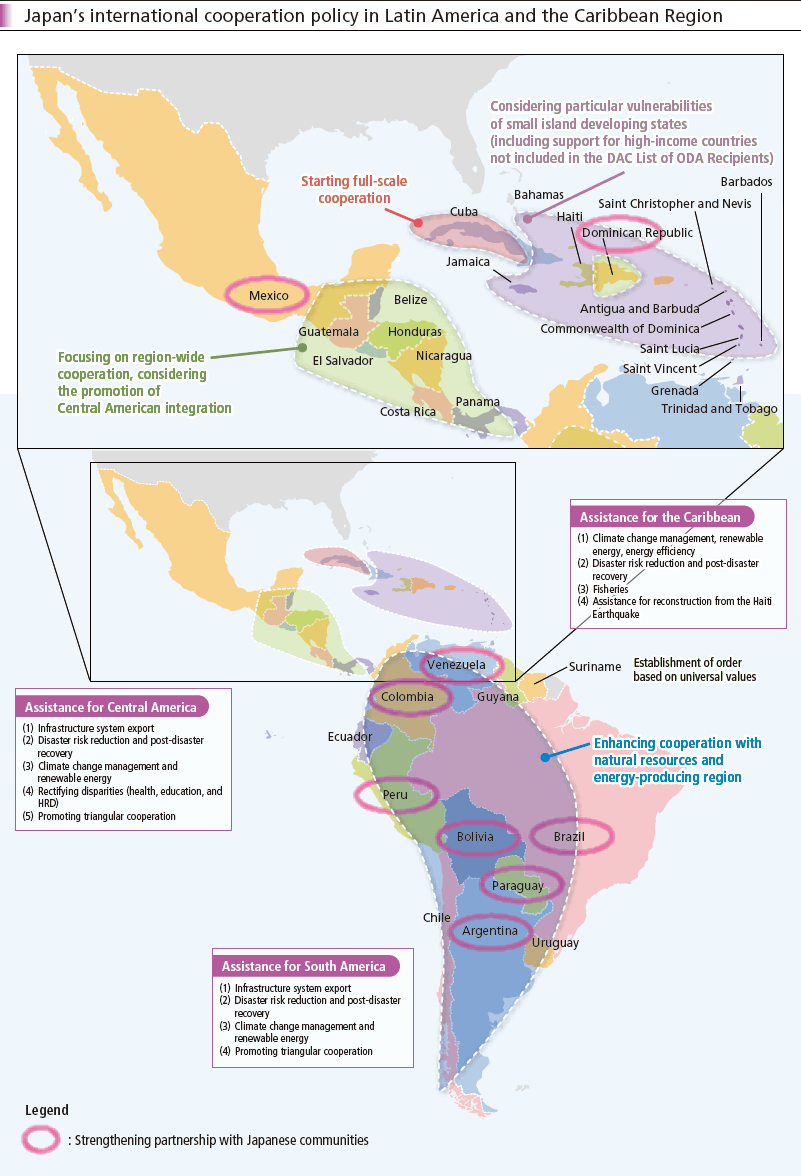
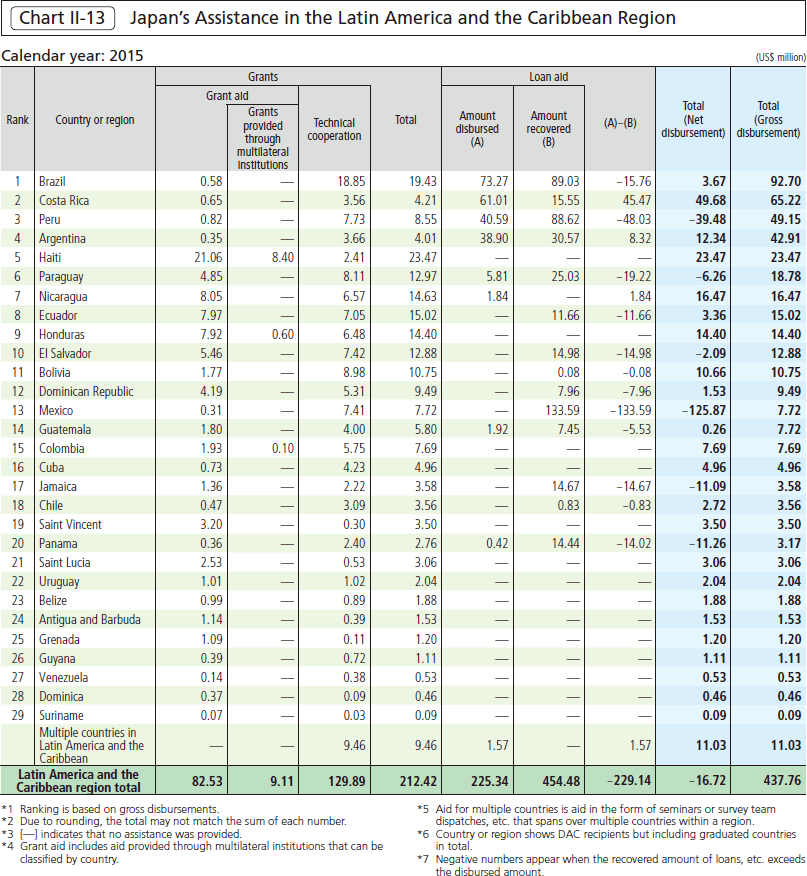
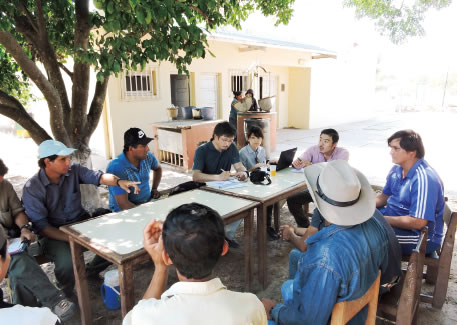
Mr. Junichi Hanai of JICA and project staff members discuss with Yellow Anaconda hunter group as part of the “Project to Support the Livelihood of Local People through the Improvement of Sustainable Use of Biological Resources in the Province of Formosa” in Argentina. (Photo: Masahiro Yasuda / Japan Wildlife Research Center)
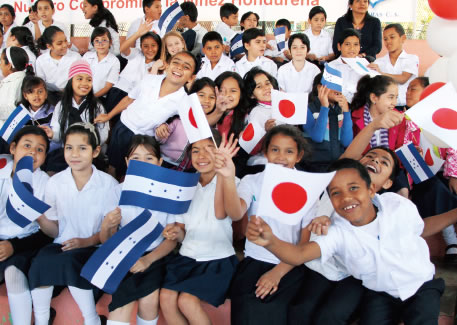
Children wave the flags of Honduras and Japan at a handover ceremony for the “Project for Extension and Renovation of Japon School, Tegucigalpa” supported through the Grant Assistance for Grass-Roots Human Security Project in Tegucigalpa, the capital of Honduras. (Photo: Hiromi Sakai / Embassy of Japan in Honduras)
•Honduras
Project for Strengthening of the Capacity Development of the Local Governments for Regional Development
Technical cooperation project (October 2011 – )
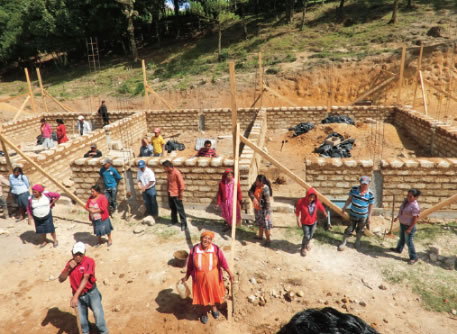
Additional classrooms are being constructed using local materials to enable children to study indoors in Yamaranguila Municipality, Intibuca Department. (Photo: FOCAL II Project)
Honduras has been promoting local development through decentralization but many local governments are small in scale and lack capabilities of finance, organization, and administration. To date, development has not progressed as intended. And their attitude of waiting for support from the outside has also obstructed the promotion of that development.
In the preceding project, Project for Capacity Development in the Western Region (commonly used name: FOCAL Project, 2006-2010), Japan supported the introduction of the “FOCAL process”, a four-stage development process for the western region consisting of (i) surveys of the current situation of the community with residents’ participation, (ii) establishment of community development projects, (iii) establishment of urban development projects, and (iv) project implementation. Following this, the Project for Strengthening of the Capacity Development of the Local Governments for Regional Development (commonly used name: FOCAL II Project) commenced in 2011 expanded the process nationwide, and has been aiming to strengthen the capabilities of local governments and the residents participating in them.
To date the FOCAL II project has strengthened the capabilities of municipal employees, employees of municipal federations,*1 and residents through the training and practice in the abovementioned four-stage process. Of 298 municipalities in the country, 130 municipalities have (i) completed surveys of the current situation of the community together with the residents, 89 municipalities have (ii) established community development projects, 83 municipalities have (iii) established urban development projects, and based on this, (iv) these municipalities are proceeding with project implementation.
A key point in the FOCAL process is “resident participation.” Past urban development projects of municipalities were designed by external consultants, which weakened a sense of participation of both residents and municipalities and made those projects unpractical. It is residents themselves and municipal employees who know about the community best. By conducting surveys and planning the projects themselves, the projects which residents truly desire will be implemented. This creates a sense of ownership over the projects within the residents. Thus the residents will volitionally participate in the projects. A trustworthy relationship between the residents and municipalities which cooperates in the project will be formed, creating a virtuous cycle.
The residents that participated in the community development projects reported with excitement about the activities they themselves had implemented. The residents commented “We will take action on our own rather than just waiting for support from someone as we had done before”, and “We will discover and solve issues by ourselves.” Furthermore, the municipal employees said, “The residents voluntarily participated in the construction work, so the financial burden of the municipality reduced” and “The residents have raised their awareness of being “taxpayers,” and consequently our tax revenues doubled.” Self-reliant local developments through empowerment of local governments and residents by adopting the FOCAL process are beginning to be seen. (As of August 2016)
- *1 Municipal federations were established as institutions to which the multiple municipalities provide contribution money and then the institutions implement technical support for each of their constituent municipalities. Currently 39 municipal federations exist and function nationwide.
•Brazil
Project for E-waste Reverse Logistics Improvement
Technical cooperation project (September 2014 – )
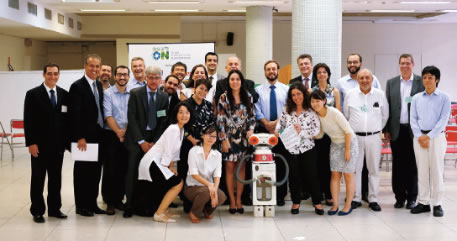
Opening ceremony for the pilot project. Members surround the mascot Descartes. (Photo: JICA)
The production and consumption of goods is increasing in Brazil due to its rapid economic growth. For that reason, the amount of waste is also rapidly increasing. Further initiatives for appropriate waste management and reduce, reuse, and recycle (3R) activities have become a challenge. In Brazil measures for implementing a circulation system (reverse logistics; RL) which takes into consideration recycling and environmentally appropriate disposal of home electrical appliances after use as waste (electronic waste; E-waste) are stipulated by the law but specific implementation methods have not been sufficiently studied yet.
As the literal translation of RL is “reverse logistics”, it refers to establishing logistics for returning products after disposal from consumers to private enterprises (manufacturers, distributors, etc.) for reuse, recycling, or appropriate final processing and disposal.
In the State of São Paulo the Technical Waste Law was brought into force in 2009, in advance of the national laws. Because it concluded a written pledge pertaining to the construction of RL with communications companies, the private sector advanced the formulation of RL for cell phones. It is considering negotiations with manufacturers for development of RL for notebook computers and white goods as well. However, when expanding the commodities covered by RL, development of more effective RL systems for E-waste becomes an issue.
Therefore, this Project for E-waste Reverse Logistics Improvement is scheduled to present an action plan for the improvement of RL introduction, by implementing a pilot project and proposing a monitoring structure based on the results of it. It is expected that this will contribute to encouraging RL implementation in the State of São Paulo and also nationwide.
The key to the success of this project depends on whether Brazil can identify the existing barriers through the pilot project and is able to establish an effective system for solving problems as well as forming consensus on them. Ministries, agencies, local governments, manufacturers, distributors, retailers, and others are related to the construction of RL systems, but these actors (entities) each have different interests and opinions. The pilot project supported by Japan handles coordination with diverse stakeholders, including the private sector. It is important that the planning and coordination capabilities in Brazil are strengthened through that process. (As of August 2016)
